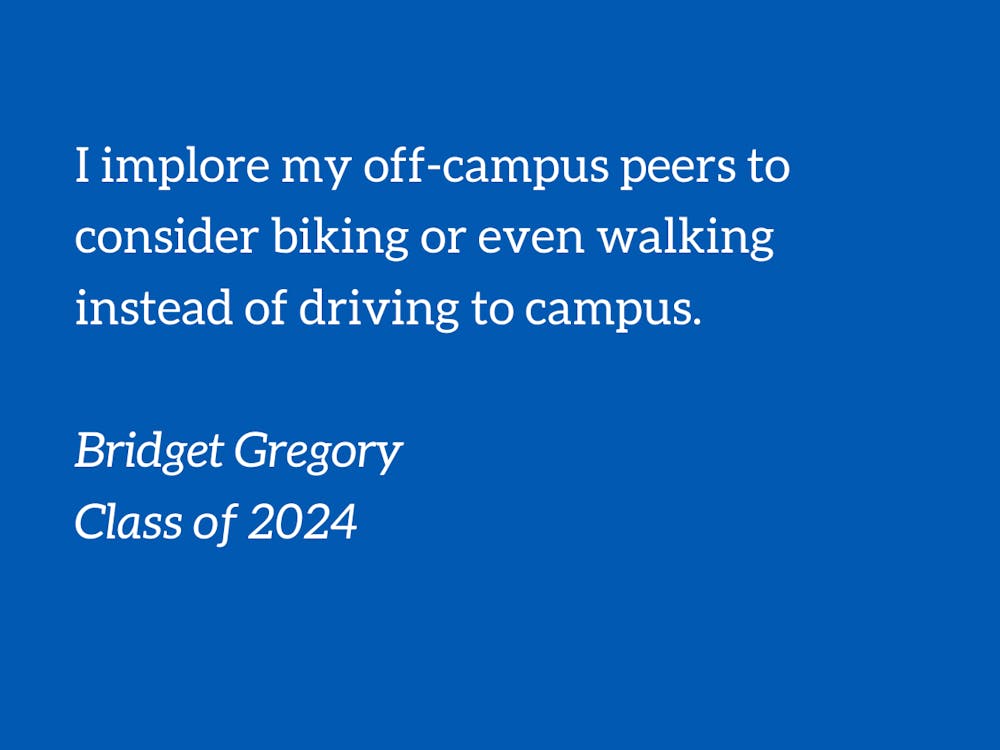While we are conditioned to believe cars are the most convenient method of transportation, this is typically untrue for the daily commute of an off-campus Duke student. Many of us are well acquainted with the frustrations of Blue Zone parking, but the actual time inconvenience it creates is astounding. Here’s the breakdown: For a student living in Berkshire 9th Street apartments, the 1.7-mile drive to the Blue Zone takes approximately 6 to 8 minutes. Once there, scouting out a parking spot adds another five or more minutes. Finding a reasonably distanced parking space is rare, so most of us are forced to park in the back lots. The trek from the back of the Blue Zone (Lot 7) to Perkins Library takes a whopping 17 minutes. Even the walk from Miracle Lot to Perkins is still 11 minutes. In total, your commute could be anywhere from 22 to 30 minutes!
Alternatively, biking could cut your commute in half, as a bike ride from Berkshire Ninth Street to Perkins Library is only 11 minutes. Not only is biking more time efficient, it will also save you money. The cost of purchasing a Blue Zone parking pass for three years is approximately $1,350. This is roughly double the price of an electric bike, which could be used for four years and beyond college. Parking rates elsewhere on campus can add up — not to mention the exorbitant fees incurred by parking tickets. Why pay so much for inconvenient parking when you could buy a bike for a fraction of the cost?
As a senior who has tried every method of transportation to get to class, I implore my off-campus peers to consider biking or even walking instead of driving to campus. Alongside the logistical and economic benefits of switching up your commute, you can also help the planet. Increasing emissions of greenhouse gasses is one of the biggest drivers of climate change as these gasses trap energy in the atmosphere and thus warm the planet, with carbon dioxide (CO2) as the biggest contributor. In the United States, transportation accounts for the most CO2 emissions out of any economic sector, with personal transportation creating the bulk of these emissions.
The average passenger car emits 0.47 pounds of CO2 per mile traveled. A commute of four miles (about the distance from Berkshire Main to Duke Campus and back) done five times per week will emit about 550 pounds of CO2 each academic year per person. The 1,350 parking spots in the Blue Zone are consistently full, suggesting a substantial number of students continue to rely on personal vehicles for daily transportation, which contributes to the unsustainable release of greenhouse gases into the atmosphere. If 1,000 students switched from driving to biking, they would collectively reduce CO2 emissions by 249.5 metric tons per year — the equivalent CO2 emissions of 31.4 houses!
For students like me with a seemingly endless number of tasks and never enough time in the day to get it all done, switching up my commute has made an extremely positive impact on my day-to-day lifestyle. No longer do I stress about finding a parking spot or scramble to leave my apartment in time to allow for a 30-minute commute. Instead, I enjoy my short bike ride and arrive to class on time and relaxed. So, why don’t you try it out? Shorten your commute, save some money, reduce your stress and seamlessly work a bit of exercise into your daily routine, while also combating climate change. It’s a change that is good for you and good for our planet.
Bridget Gregory is a Trinity senior.
Get The Chronicle straight to your inbox
Signup for our weekly newsletter. Cancel at any time.

